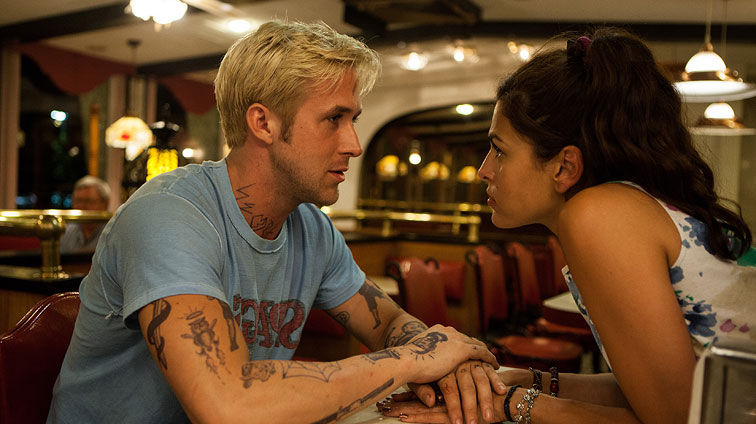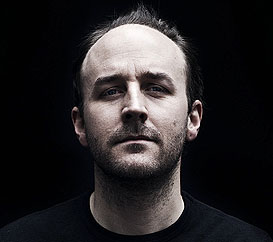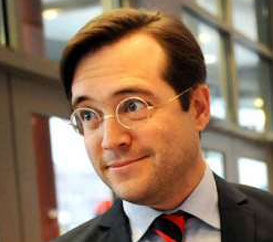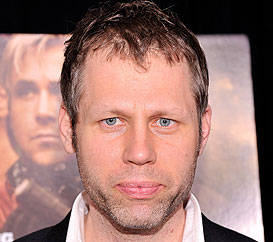
The Sins of the Father
Derek Cianfrance, Ben Coccio, and Darius Marder embark on an ambitious meditation about the true nature of violence, the epic triptych The Place Beyond the Pines.
 Derek Cianfrance
Derek Cianfrance
 Ben Coccio
Ben Coccio
 Darius Marder
Darius Marder
I see so much fetishized violence, these days, I feel it's my responsibility as an artist and filmmaker to put out a real portrayal of violence.
—Derek CianfranceWhile he was making documentaries and developing his second narrative feature, Blue Valentine, Derek Cianfrance was simultaneously collaborating with writer Ben Coccio, followed by writer Darius Marder, on what was to be his third effort The Place Beyond the Pines. Pines is a triptych drama which begins with Ryan Gosling's Luke, a wayward motorcycle stuntman, discovering he has fathered a child with Romina (Eva Mendes) the last time his carnival passed through Schenectady, New York. Luke decides to stick around and support the child but discovers no easy means by which to do so, and resorts to robbing banks. The trouble that ensues when he encounters local cop, Avery, played by Bradley Cooper, ripples through the generations, 15 years hence, with their respective sons, AJ (Emory Cohen) and Jason (Dane DeHaan).
Cianfrance says the film's idea was generated by his desire to do a Western. "It would be about events that lead up to a violent moment, the effect of that violent moment, and that generational impact," he says, recalling that he considered telling it in a non-linear fashion. Preferring to write with collaborators, he brought on Coccio, who wanted to modernize the story.
"It was apparent to me right off the bat this needed to be a linear story," says Coccio. "The story Derek wanted to tell was about fate, and I felt fate had to build in order of events for it to have any kind of impact at the end. In thinking about Derek's story as three stories that need each other, I already had two ideas that I had wanted to make into their own movies, which I thought would mesh perfectly for the first two segments." And they were off and running.
When Marder came aboard, he and Cianfrance focused on perhaps the script's greatest challenge, which was making the three stories into one cohesive narrative. Finding visual and emotional cues to string the story's themes throughout thus became a focus.
"What I enjoy so much about Derek's work is that he is compelled to tell stories that are so dangerous and precarious that, especially in the writing phase, you truly feel like you're walking on a tightrope," says Marder. "The reward, to push the analogy, is that you might experience something transcendent; something that gives you a glimpse into a deep truth. The flipside is that you might fall. So how to stay on the wire?"
How indeed?
Your story has epic scope, and I'm wondering what you felt was key to making it work?
Coccio: When you write something that has an epic sweep, it helps to remind yourself it's still a simple story as simple or basic as any story. Derek's story was always there as the backbone, and it could inform any choice or decision. Of course, you end up going down blind alleys and adding more than you need, but you also end up sort of building the "multi-verse" for these characters. By draft 20, we had seen all these characters do anything they could have done in any given situation. We'd tried it all.
You don't spoon feed your viewers. Rather, you let them find things. What do you want to give an audience and what you expect from it?
Cianfrance: I'm trying to make films that I want to see as an audience member. I like films that surprise me. I like to be respected, instigated, and provoked, and I like to watch movies that are alive upon the screen. I like to watch movies that that don't preach to me, and that stay with me when I leave. My favorite films change throughout the course of my life as I change. I'm trying to make movies that are organisms, that are living things.
It sounds like you let people project onto your movies.
Cianfrance: Yes, absolutely. They're open enough for that, for people to bring what they will from their own lives; or for people to resist the movies for those same reasons.
What are those movies you return to over time?
Cianfrance: Gospel According to St. Matthew by [Pier Paolo] Pasolini, is one of the huge movies in my life. I thought I was having a heart attack while was watching that movie; the whole left side of my body went numb. I had an anxiety attack brought on by cinema. I like movies that break into that place. Goodfellas, [John] Cassavetes's work because they feel alive to me, like these are moments that can't happen twice. The Maysles Brothers movies like Gimme Shelter and Salesman because they deal with real life.
I learned to embrace life while I was directing documentaries. When I made Blue Valentine I'd written 66 drafts of the script, I'd storyboarded everything [1224 shots], but when I got on set I wanted it to be alive. So I asked the actors to surprise me, and I was a little disappointed if they did the script. The script was there as a blueprint. Just like I'm trying to make a movie to instigate the audience, the script is there to instigate the actors. I want them to do something that they can't do again.
With Pines, there were the 37 drafts of the script. We knew what the scenes need to do and there's some great dialogue in there, and we always do it but I also want to see all the choices the actors made, and see how they affect in a different way, in a way that I couldn't necessarily write or expect.
All these movies that I love so much, Goodfellas, Woman Under the Influence, Gospel According to St. Matthew, or Gimme Shelter especially; they're all living in this collision between real life and fiction, between performance and truth of who the actor is and who the character is. There's this collision between the script and the documentary. I'm always trying to find that middle ground. I don't think I would ever be a writer if I wasn't a filmmaker. I write so I can be there. When you write a script and go on set, there's an expectation of what you're going to get. Instead of going in with expectations, I like going in with preparations, prepared to capture these fleeting things that will happen.
Tell me about that introduction to Gosling's character he's playing with a knife and you don't see his face or understand where he is for quite a while. How you think about character introductions, in general?
Cianfrance: They're huge in movies, and I always think about John Wayne in Rio Bravo. This foot comes and kicks the spittoon away. Dean Martin looks up and you see John Wayne, low angle, godlike image of this guy. You know everything about him from that moment. With Pines we wanted to introduce our characters in similar ways. The first five or 10 minutes of every movie you're training the viewer on how they need to watch. I wanted the viewer to be active in this movie. I wanted their imaginations to turn on, to be engaged, to be physically empathetic with the character.
Many of your characters are more physically expressive than they are verbal. How do you put that on the page so it comes across?
Cianfrance: I try to put actors in physical situations and trust them to be that person. Writing physicality on the page is important, and you have to be specific because you're describing character, not just through dialogue. Film isn't just a medium for talking heads. That's why I love the first 30 years of cinema; visual storytelling, visual character. Everything I write physically into a script, I write as instigation; here's a challenge to the actor. But at the same time you want the reader to know what's there. It's a balancing act.
Pines carefully builds characters capable of doing terrible things, yet I still felt surprise when some of them happened, like when Luke beat Kofi. How do you think about feeding the audience little character and thematic elements until they explode?
Cianfrance: In my life I've never met a villain or a heroic person. I've met a lot of people that live in this grey area. I'm trying to let my characters be as gray as possible, to be good and bad, because they're human. It also has to be true. It's like that Hitchcock thing of suspense vs. surprise. You try to put little pieces in. With Gosling's character, you start him out dangerous, doing dangerous things. Then the next scene is him holding a baby. You have danger with this nurturing and fragility. You also see the shame with which he holds the baby; he wipes his hands before he holds it; he isn't clean enough to hold the baby. Then you realize his psychology, how wounded he is.
I'm dealing with tragic themes on a Greek level; characters trying to avoid something. Luke is trying to avoid his son coming to feel the way that Luke felt when he was a fatherless kid. So he's going to be there for him. But he's a force of love, not a force of security. So for Romena, who is she going to choose? This dangerous inferno of a man, or her baby? So she chooses her baby, and it makes Luke crazy. You can understand both of their choices. Luke has got to do some crazy things to support his kid, so he does them, and eventually his choices take him out of his son's life. By trying to avoid that, he ends up running into it. Every one of the characters in this movie is trying to avoid the destiny, a legacy, and by avoiding it they wind up colliding into it.
You mentioned Hitchcock, and another obvious element to the film is the Psycho-like handoff of the story between characters, particularly from the first piece of the triptych to the second. How did you deal with the concern of dropping the audience?
Coccio: While I was writing, I never worried about losing the audience in the handoff moments because I always saw the story as one story, not three. Your story doesn't end with your death or at the end of some defining episode in your life; it goes on and on in new ways, like an endless history. I felt strongly that we were illustrating that with this movie.
Marder: One of the things that make the handoffs in Pines so tricky is that the first act is so disarmingly traditional in its structure. The more it "works" the more difficult the switch to the second act becomes. The audience goes through a similar experience of disbelief entering the second act as Avery goes through the film. I worked a lot with Derek to bring forth Avery's inner life [guilt, shame, denial] as our connective thread to the first act. As an audience we're looking for the connection to Luke [the past] wanting the connection even as Avery is pushing it away.
So often when we grieve we hold onto the smallest things that connect us to what once was, hoping in some way to resurrect the past even when we know it is an impossibility. It is this desire for a resurrection, though, that I hoped could actually keep us rooted in the film. The key to that connection is actually Avery's shame. Had Avery not cared about the final events of the first act, our connection would have been lost. But it is exactly this shame and denial that pushes him further into the plot of act two, until the storyline itself takes hold enough for us to let go of our need to resurrect.
Cianfrance: After I saw Psycho 20 years ago, I was blown away by the idea of that baton pass. I'd also seen Abel Gance's Napoleon, and always wanted to do a triptych movie. Then when my wife was pregnant in 2007 with our second son, I started thinking about legacy and everything I was going to pass on to him. I decided to give these passes of the flame between generations, and what this movie was became clear. I wanted to deal with violence in a movie that had an actual narrative effect. It's not about how viscous I can make the blood, or visceral the violence. It was about violence as narrative, and what happens with this adrenaline that leads to these choices, that lead to this violent event. Then, what that violent event does and how that echoes throughout the generations. As an audience member, you're caught in this adrenaline and these choices, then all of a sudden violence happens and, just like in real life, there's no going back. There's no safety that you're just watching a movie. I wanted the viewer to feel that, knowing that it's the most dangerous thing to do in a narrative way. I see so much fetishized violence, these days, I feel it's my responsibility as an artist and filmmaker to put out a real portrayal of violence.
Did you think about thematic echoes then, running through it to bring the audience through?
Cianfrance: Yes, and reverberations that take the moment of that first baton pass and making the whole movie about everything that grows from it. Realizing that that was our pinnacle is what really happened with Darius and myself. Ben was scope; here's these three epic stories. When Darius and I came in there was that overall arc: how did Avery get to that moment and make that mistake? Ambition to be his own man. Reverberation from that leads him into this corruption that puts him back as his father's son. But then he can never get away from the corruption of that moment, and that becomes materialized in his own son because he couldn't deal with it. He also couldn't deal with his family. In doing my research and talking to cops and soldiers, the divorce rate among cops is huge because the stress of the job. Those are all things that we worked into those choices and legacy.
Marder: It's all very Oedipal but that is in fact the central theme of this film. Can we break the chain of fate or are we doomed to live out our inherited tragic roles? And it is only through the generations that we can really glimpse this question. Ultimately, there is the truth [that we witnessed in the first act], that Jason was born into a crazy, unstable scenario, but that within that scenario there was great love. We use the photograph of him and his parents as the glue for all three acts, perhaps providing some solace that while, yes, pain echoes through generations, perhaps so too might love.
Coccio: The most amazing thing about our collaboration was how well our strengths complemented each other. Derek worked from a place of fluidity first and foremost, and I worked from a place of structure first and foremost. I learned that you need both, and in writing Pines with Derek, I learned how to use fluidity as a tool. I also was able to provide him with a solid foundation, a logic, and I could always say, "If we try this, we have to give up that." Because of that, I was able to give him valuable counsel on what choices he wanted to make.
© 2013 Writers Guild of America West
